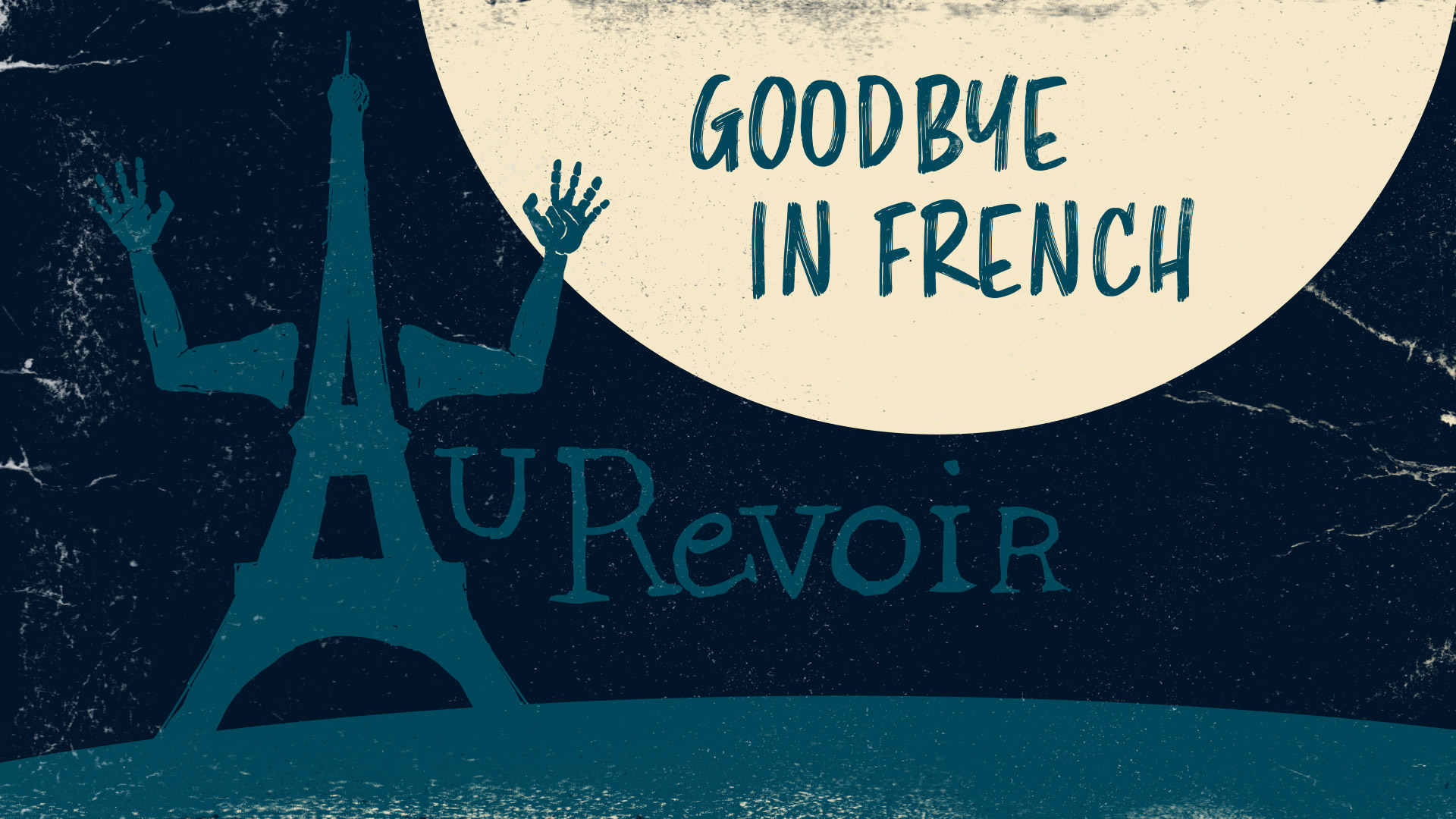10 Ways to Say “Goodbye” in French
Here is a quick list of common ways to say “goodbye” in French:
- au revoir – “goodbye”
- salut – “bye”
- à bientôt – “see you soon”
- à demain – “see you tomorrow”
- adieu – “farewell”
- au revoir, mon ami – “goodbye, my friend”
If you’re not in a rush and you’re asking yourself one of the following questions:
- What does au revoir exactly mean?
- Do French people use foreign words to say goodbye?
- How do you say “see you next time” in French?
- How do you say goodbye until a fixed date?
… Keep reading this post! You’ll become a master at saying goodbye in French.
Learning to say goodbye is one of the first things you should do when learning a new language. French greetings and goodbyes will be words you use on a daily basis in the language, after all.
Let’s get started!
How to Say “Goodbye” in French: Au Revoir
How do you say “goodbye” in French?
If you’ve taken French classes at some point in your life, you’ve probably heard that “goodbye” is au revoir in French. It’s the most common way to say “goodbye” in French.
But what does au revoir mean, exactly?
In French, au means “at”, and revoir is a noun that we can loosely translate as “seeing each other again” or “meeting again”. It doesn’t make much sense to translate it this way, though.
In a simplified way, au revoir could be “until we see each other again”. It carries the hope and disguised certainty of meeting again.
Au revoir can be both formal and informal. Pair it with monsieur (“sir”), madame (“mrs”), or mademoiselle (“miss”) to make it properly formal. Add a family member or a first name after it if you want it to be more informal.
Native tip: It’s common today to hear it pronounced as au r’voir — phonetically o rvoar, even in a formal setting.
However, you must know that au revoir isn’t often used among people who are on close terms. Think about it: do you often part from your friends with a “goodbye”?
If you really need to know how to say “goodbye, my friend”, here is the answer: au revoir, mon ami. But that’s not a frequently used expression.
Us French prefer to use other versions of “bye”.
How to Say “Bye” in French: Salut
So how do you say “bye” in French? We use several words for a casual goodbye.
First of all, there is salut. Salut literally means “greeting” and it’s used both as a greeting and a goodbye. It’s a bit like ciao in Italian.
Speaking of ciao… French use it as an alternative to salut. Not as a greeting, though, just to say farewell.
And as we’re talking about foreign words, let me tell you… You might also hear French say “bye”! Using English words in daily situations has become common among French youth.
What can we say… English is trendy.
If you’re going to use address any of these three goodbyes to a group, you can add tout le monde (“everyone”, literally: “all the world”) at the end.
Salut, ciao, and bye are often preceded by allez in French. Allez means something like “all right” in this case.
Example: Allez, salut! (“All right, bye!”)
How to Say “See You Soon” in French: À Bientôt
French don’t literally say “see you soon”. We have an equal expression that’s made of the preposition à (“at”) and the adverb bientôt (“soon”). In this type of phrase, à more exactly means “until”.
It doesn’t make much sense if you put these two words together in English, but it’s absolutely correct in French.
À bientôt tends to fall on the informal side but still remains polite. You wouldn’t leave the office by throwing a “see you soon” at your boss, but you would probably use it with a colleague.
If you’re not too sure when to use it and don’t want to make a gaffe (“blunder”, familiar), keep in mind that it’s safer to pair it with tu rather than vous.
How to Say “See You Later” in French: À Tout à l'Heure
Like “see you soon”, “see you later” doesn’t have a literal translation in French. In its equivalent expression, the preposition à precedes the phrase tout à l’heure (“in a moment”).
You might also hear French saying à toute, the abbreviated, slang version of à tout à l’heure.
How to Say “See You Now” in French: À Tout de Suite
Tout de suite is something like “immediately” and “right after now” in French.
You can use à tout de suite when ending a phone conversation with someone you’re on your way to meet. It also works in similar situations.
How to Say “See You” in French: À plus
“See you” is “see you later”’s shortened and more slang-ish version. Its French equal is à plus. As you’ve probably guessed, it comes from à plus tard.
Native tip: Unlike in à plus tard, you have to pronounce the s in à plus.
Remember to never, ever use it in a formal setting. It’s reserved for friends and family members.
How to Say “See You Next Time” in French”: À la Prochaine
To say “see you next time” in French, use à la prochaine. Prochaine means “next”, so the expression literally translates to “until the next”.
How to Say “See You Tomorrow” in French: À Demain
Demain means “tomorrow” in French, so à demain is “see you tomorrow”.
How to Say “See You on…” in French:
Let’s say that your date has gone particularly well and you have decided to have another one on Monday. To say “see you on Monday”, say à lundi.
Add one of the French days of the week after à to get all the versions of this phrase:
| Monday | lundi |
| Tuesday | mardi |
| Wednesday | mercredi |
| Thursday | jeudi |
| Friday | vendredi |
| Saturday | samedi |
| Sunday | dimanche |
Native tip: Remember that the French days of the week don’t start with a capital letter unless they open a sentence.
How to Say “See You…, Then” in French: On Se Voit…, Alors
On se voit…, alors means “we’ll see each other…, then”. This phrase is not a goodbye per se, it’s more like a confirmation.
You have to replace the three dots by the time you expect to see each other again.
Here are ways to complete on se voit…, alors:
- on se voit demain, alors – “see you tomorrow, then”
- on se voit lundi, alors or any other day – “see you on Monday) then”
- on se voit la semaine prochaine, alors – “see you next week, then”
- on se voit dans deux semaines, alors – “see you in two weeks, then”
- on se voit le mois prochain, alors – “see you next month, then”
With precise times such as tomorrow or a set day of the week, you could specify the hour by adding à … heure(s) to the phrase.
Examples:
- on se voit à dix heures demain, alors – “see you at ten tomorrow, then”
- on se voit lundi à treize heures, alors – “see you at one pm Monday, then”
Remember that the French hours go from 0 to 24.
How to Say “Have a Good Day” in French: Bonne Journée
French people don’t say “have a good day”. We simply say bonne journée (“good day”).
This is only a goodbye. Don’t confuse it with bonjour, the greeting.
How to Say “Have a Good Afternoon” in French: Bon Après-Midi
Like with bonne journée, French speakers don’t say “have a good afternoon” but bon après-midi or bonne après-midi (“good afternoon”). We don’t use this as a greeting either.
Native tip: Yes! “Afternoon” in French can both be masculine and feminine. It’s a rare occurrence in non-adjective words in French. Usually, when French words have dual-gender, they have different meanings.
Here’s a fun fact you can share with your French learning buddies!
How to Say “Have a Good Evening” in French: Bonne Soirée
Bonsoir (“good evening”) is a greeting in French. You want to use bonne soirée (“good evening”) to part with someone before dinner.
How to Say “Have a Good Night” in French: Bonne Nuit
To say “have a good night” in French, say bonne nuit (“good night”).
You can also say passe une bonne nuit which literally means “spend a good evening”. Add passe un/une to bonne journee, bon après-midi, and bonne soirée to get the same result.
How to Say “Take Care” in French: Prend Soin de Toi
Saying “take care” is a warmer way to part from your friends or family, so why not use it in French, too?
There are two main ways to say “take care” in French. The first is prend soin de toi (literally: “take care of yourself”).
The second one is fais attention à toi (vaguely: “take good care of yourself”).
You can use both to express that you care about the person you’re parting with. They’re fine in a casual and formal setting.
Native tip: Remember that there are two “you” in French. Tu is the informal singular second person. Vous is the formal singular second person or plural second person.
Prend soin de toi becomes prenez soin de vous with vous. Fais attention à toi becomes faites attention à vous.
How to Say “You Too” in French: “Toi Aussi”
If you want to return a goodbye such as prend soin de toi or passe une bonne nuit, say toi aussi (“you too”) or toi de même (“you as well”).
How to Say “Goodbye, Until Next Time” in French: Au revoir, à la Prochaine
As you can see, au revoir, à la prochaine mixes two phrases we’ve covered earlier in the post. Au revoir, à la prochaine means “goodbye, until next time”.
You can get other similar expressions by pairing au revoir with another phrase. You could say “goodbye, see you tomorrow” with au revoir, à demain or “goodbye, see you on Monday” with au revoir, à lundi.
How to Say “Kisses” in French: Bisous
French people are fond of ending phone calls by saying bisous (“kisses”) or je t’embrace/je vous embrasse (“kisses”/“hugs”).
Both expressions can be used to end letters or emails as well. Keep in mind that they’re reserved for warm goodbyes with people who are close to you.
How to Say “Keep in Touch” in French: On s’Appelle or On s’Écrit
On s’appelle literally means “we’ll call each other” in French. On s’écrit is “we’ll write to each other”.
You can use both expressions after you’ve walked your date to their apartment or if you have to leave a friend in a hurry and wish to hear from them soon.
Both are quite informal.
How to Say “Nice to Meet You” in French: Content/e de T’Avoir Connu/e
Let’s say that you met one of your friend’s friend. You’re not sure you’ll see them again but still want to say goodbye in a warm way. Use:
- content de t’avoir connu – “nice to know you” from man to man
- content de t’avoir connue – “nice to know you” from man to woman
- contente de t’avoir connu – “nice to know you” from woman to man
- contente de t’avoir connue – “nice to know you” from woman to woman
Native tip: Replace t’ with vous for a formal or plural goodbye.
The even more formal version uses ravi/e (“delighted”) instead of content/e. You could also replace de t’/vous avoir connu/e with d’avoir fait ta/votre connaissance.
How to Say “Farewell” in French: Adieu
If you’re a fan of crosswords, adieu may be familiar to you. When there is the clue “goodbye in French” in crossword puzzles, the possible answers are either au revoir or adieu.
However, don’t let that trick you into thinking that you can interchange au revoir and adieu at your pleasure. Adieu has a sense of final goodbye that no one likes to express. It’s lasting, permanent.

Adieu literally means “to God” in French. According to its etymology, adieu‘s whole meaning is something like “we’ll see each other when we’re next to God.”
In other words, if you told your date adieu you’d be saying something like I’ll see you in the afterlife. Not ideal if you want to snatch a second rendez-vous (“date”).
Adieu as a noun translates to “farewell” or “final goodbye” in English. The phrase faire ses adieux (“saying a final goodbye”) is one of the most common ways to hear adieu in spoken French. The word’s use in general is quite rare because of its gloomy nature.
Let’s say it: adieu belongs in romantic tragedies on the screen or in novels.
Why Learning to Say “Goodbye” in French Matters
Imagine that you met a French person you’d like to impress. It might be a client, a potential friend, a cute person in a bar. You had a nice interaction and they started to like you. Wouldn’t you want to wrap that in a perfect way?
If you want to leave a lasting impression, being able to take the right goodbye out of your pocket is crucial. You don’t want to part with your date with a goodbye that could cancel the romantic vibe you’ve struggled to create.
But wanting to impress isn’t the only motivation you have to learn how to say “goodbye” in French.
Saying goodbye properly may make you come across as polite, warm, friendly. It’s a way of displaying your good manners and making you someone whom others like to have around.
It’s Time For Us to Say Au Revoir
Congratulations! You’re a pro at saying goodbye in French. Which goodbye is your favorite?
Now that you know how to close conversations in French, would you like to review how to start them? Check out Benny Lewis’s awesome post for that.
If you’re looking to get more French under your belt before you actually go one a French date, have a look at this page. Benny put together the best resources you can find on the internet to learn French!
I guess the time has come for us to say goodbye! But ce n’est pas un adieu (“it’s not a final goodbye”). I’ll see you very soon with new handy French posts.
À bientôt!




Social